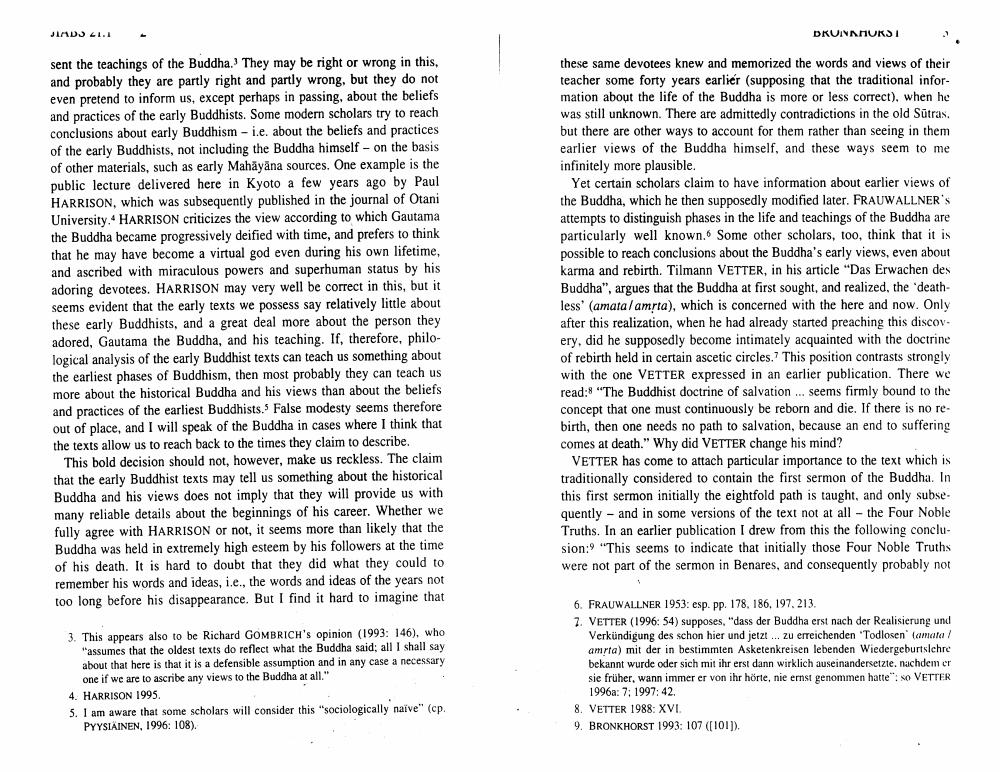Book Title: Did Buddha Believe In Karma And Rebirth Author(s): Johannes Bronkhorst Publisher: Johannes Bronkhorst View full book textPage 2
________________ JLADS 21.1 sent the teachings of the Buddha. They may be right or wrong in this, and probably they are partly right and partly wrong, but they do not even pretend to inform us, except perhaps in passing, about the beliefs and practices of the early Buddhists. Some modern scholars try to reach conclusions about early Buddhism - i.e. about the beliefs and practices of the early Buddhists, not including the Buddha himself - on the basis of other materials, such as early Mahäyäna sources. One example is the public lecture delivered here in Kyoto a few years ago by Paul HARRISON, which was subsequently published in the journal of Otani University. HARRISON criticizes the view according to which Gautama the Buddha became progressively deified with time, and prefers to think that he may have become a virtual god even during his own lifetime, and ascribed with miraculous powers and superhuman status by his adoring devotees. HARRISON may very well be correct in this, but it seems evident that the early texts we possess say relatively little about these early Buddhists, and a great deal more about the person they adored, Gautama the Buddha, and his teaching. If, therefore, philological analysis of the early Buddhist texts can teach us something about the earliest phases of Buddhism, then most probably they can teach us more about the historical Buddha and his views than about the beliefs and practices of the earliest Buddhists. False modesty seems therefore out of place, and I will speak of the Buddha in cases where I think that the texts allow us to reach back to the times they claim to describe. This bold decision should not, however, make us reckless. The claim that the early Buddhist texts may tell us something about the historical Buddha and his views does not imply that they will provide us with many reliable details about the beginnings of his career. Whether we fully agree with HARRISON or not, it seems more than likely that the Buddha was held in extremely high esteem by his followers at the time of his death. It is hard to doubt that they did what they could to remember his words and ideas, i.e., the words and ideas of the years not too long before his disappearance. But I find it hard to imagine that 3. This appears also to be Richard GOMBRICH's opinion (1993: 146), who "assumes that the oldest texts do reflect what the Buddha said; all I shall say about that here is that it is a defensible assumption and in any case a necessary one if we are to ascribe any views to the Buddha at all." 4. HARRISON 1995. 5. I am aware that some scholars will consider this "sociologically naïve" (cp. PYYSIÄINEN, 1996: 108). DRUNAMUKSI these same devotees knew and memorized the words and views of their teacher some forty years earlier (supposing that the traditional information about the life of the Buddha is more or less correct), when he was still unknown. There are admittedly contradictions in the old Sutras. but there are other ways to account for them rather than seeing in them earlier views of the Buddha himself, and these ways seem to me infinitely more plausible. Yet certain scholars claim to have information about earlier views of the Buddha, which he then supposedly modified later. FRAUWALLNER'S attempts to distinguish phases in the life and teachings of the Buddha are particularly well known. Some other scholars, too, think that it is possible to reach conclusions about the Buddha's early views, even about karma and rebirth. Tilmann VETTER, in his article "Das Erwachen des Buddha", argues that the Buddha at first sought, and realized, the 'deathless' (amatalamṛta), which is concerned with the here and now. Only after this realization, when he had already started preaching this discovery, did he supposedly become intimately acquainted with the doctrine of rebirth held in certain ascetic circles. This position contrasts strongly with the one VETTER expressed in an earlier publication. There we read: "The Buddhist doctrine of salvation... seems firmly bound to the concept that one must continuously be reborn and die. If there is no rebirth, then one needs no path to salvation, because an end to suffering comes at death." Why did VETTER change his mind? VETTER has come to attach particular importance to the text which is traditionally considered to contain the first sermon of the Buddha. In this first sermon initially the eightfold path is taught, and only subsequently and in some versions of the text not at all the Four Noble Truths. In an earlier publication I drew from this the following conclusion:9 "This seems to indicate that initially those Four Noble Truths were not part of the sermon in Benares, and consequently probably not 6. FRAUWALLNER 1953: esp. pp. 178, 186, 197, 213. 7. VETTER (1996: 54) supposes, "dass der Buddha erst nach der Realisierung und Verkündigung des schon hier und jetzt ... zu erreichenden Todlosen' (amata! amṛta) mit der in bestimmten Asketenkreisen lebenden Wiedergeburtslehre bekannt wurde oder sich mit ihr erst dann wirklich auseinandersetzte, nachdem er sie früher, wann immer er von ihr hörte, nie ernst genommen hatte": so VETTER 1996a: 7; 1997: 42. 8. VETTER 1988: XVI. 9. BRONKHORST 1993: 107 ([101]).Page Navigation
1 2 3 4 5 6 7 8 9 10
